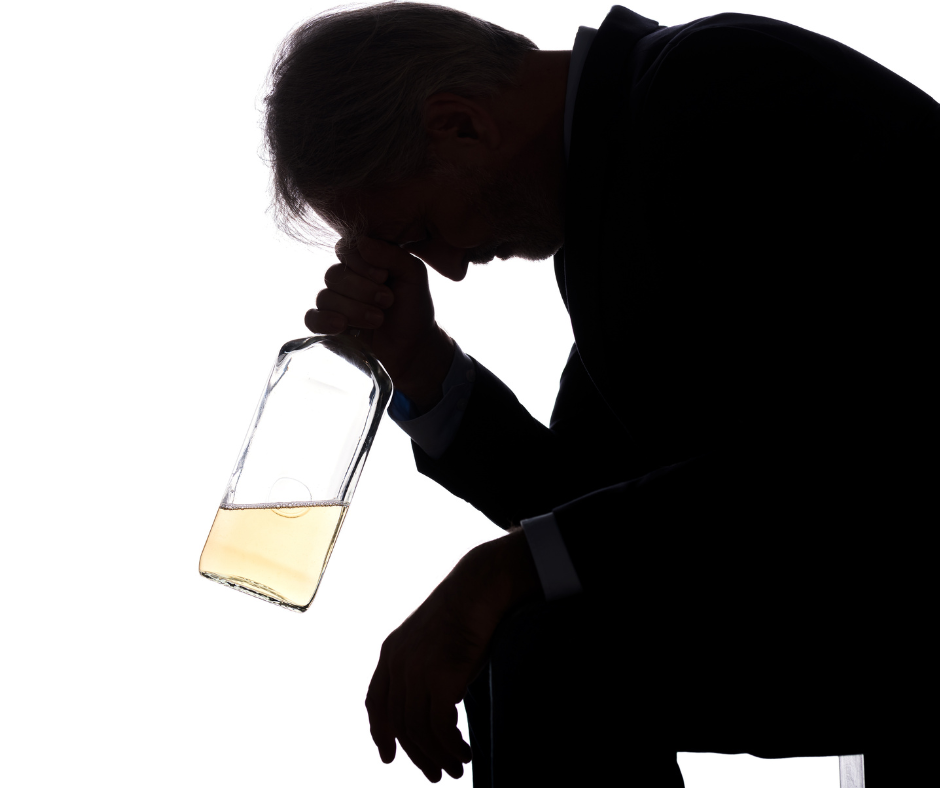Embarking on the journey to sobriety can be daunting, especially when it involves navigating the turbulent waters of alcohol withdrawal. However, with the right knowledge and strategies at your disposal, you can learn how to safely stop drinking alcohol at home. This blog post is your guide, offering comprehensive and practical advice on understanding alcohol dependence, preparing for a home detox, managing withdrawal symptoms, and more. Let’s embark on this journey together, toward a healthier, alcohol-free life.
Short Summary
-
Understand and identify alcohol dependence
-
Consult a medical professional before attempting home detoxification
-
Seek support from family, friends, healthcare professionals and therapy/counseling during recovery to prevent potential relapse
Understanding Your Alcohol Dependence

Alcohol addiction, dependence, and alcohol use disorder are medical conditions that can have profound implications on an individual’s physical and mental health, as well as their relationships with others. The inability to control drinking alcohol, coupled with the potential risks associated with abruptly discontinuing alcohol consumption, necessitates a safe and planned approach to alcohol detox.
This understanding is integral to safely navigate the path to sobriety.
Identifying Alcohol Addiction

Recognizing the signs of alcohol addiction is the first step towards recovery. It is essential to self-assess for signs of alcohol addiction, such as an increased tolerance to alcohol, an inability to control alcohol intake, and experiencing withdrawal symptoms upon reducing or stopping alcohol consumption.
These symptoms signify the onset of Alcohol Withdrawal Syndrome, which typically arises upon suddenly ceasing or drastically reducing alcohol intake.
Recognizing Physical Symptoms of Alcohol Dependence
Recognizing physical symptoms of alcohol dependence is critical in assessing the severity of the addiction. These symptoms can include changes in appetite, sleep patterns, and mood, which may escalate in intensity based on factors such as age, gender, and the duration of the addiction. Severe withdrawal symptoms can lead to dehydration, electrolyte imbalances, and malnutrition, resulting in serious medical complications.
Therefore, it’s crucial to reach out to a medical professional upon noticing these symptoms.
Consulting a Medical Professional
Consulting a medical professional prior to attempting a home alcohol detox is essential due to the potential risks associated with withdrawal symptoms, such as hallucinations, seizures, and heart failure. Medical professionals can assess the severity of alcohol abuse, which can determine the severity of alcohol withdrawal symptoms that can be managed at home.
Seeking medical oversight at a leading addiction treatment center in SC is essential for a safe alcohol detoxification process. Attempting to detox from alcohol on your own, especially if other substances have been used along with it, can pose significant risks. That’s why we always advise individuals to consider professional help at our facility before embarking on a home detox journey.
Preparing for a Home Alcohol Detox

Preparing for a home alcohol detox involves a combination of personal preparation and professional guidance. It is a process of reducing alcohol consumption and managing withdrawal symptoms at home, with a plan and support from family or friends.
However, it is crucial to remember that attempting alcohol detox at home without the supervision of a medical professional can potentially be dangerous.
Reducing Alcohol Intake Gradually
Gradually reducing alcohol intake is a key step in preparing for a home detox. It is important to:
-
Establish limits for moderate alcohol consumption and monitor your drinking habits.
-
Identify and manage triggers that may lead to drinking. This could involve avoiding certain places or people.
-
Find alternative methods of coping with stress or difficult emotions to help manage alcohol cravings.
Seeking assistance from family, friends, or a support group can facilitate this process and provide motivation and accountability. tsi technqiue is often deemed more effective and safer than quitting alcohol cold turkey.
Creating a Support System
A strong support system is integral during the process of detoxification. It provides emotional and physical assistance, as well as accountability and motivation during a challenging period. This can be beneficial in preventing potential relapse.
The support system should encompass family members, friends, and healthcare professionals such as a physician, psychotherapist, or substance abuse specialist.
Establishing a Safe and Comfortable Space
Creating a suitable environment for a home detox involves:
-
Selecting a tranquil, confidential, and well-aerated area with exposure to natural light
-
Ensuring comfortable seating and bedding
-
Providing access to nutritious food and beverages
Additionally, having a convenient bathroom nearby is a practical consideration for your comfort and safety.
Managing Withdrawal Symptoms at Home

Managing withdrawal symptoms at home involves a combination of self-care practices and medical oversight, if necessary. Common symptoms of alcohol withdrawal include:
-
Fatigue
-
Anxiety
-
Depression
-
Loss of appetite
-
Nausea and vomiting
-
Insomnia
-
Trembling
It is important to seek medical attention if you experience severe or prolonged withdrawal symptoms.
The most severe symptoms generally occur between 24 and 72 hours after one decides to stop drinking.
Hydrating and Eating Nutritious Meals
Staying hydrated and consuming healthy meals is crucial during alcohol detox. Water, juice, broth, ice pops, and gelatin are suitable options for hydration.
Also, maintaining a balanced diet during detox is essential for meeting caloric requirements and ensuring adequate nutrient intake.
Engaging in Relaxation Techniques
Engaging in relaxation techniques can help manage withdrawal symptoms by reducing stress and anxiety levels. Techniques such as:
-
Meditation
-
Exercise
-
Progressive muscle relaxation
-
Yoga
-
Alternative medicine options such as chiropractic care, massage therapy, and acupuncture
These activities can help to reduce stress and anxiety levels, allowing the individual to focus on their recovery.
Monitoring Blood Pressure and Other Vital Signs
Monitoring blood pressure and other vital signs is essential for managing withdrawal symptoms as it can help identify potential complications and permit timely medical intervention if needed. You can monitor your blood pressure and other vital signs at home by using a home blood pressure monitor or by visiting your doctor or healthcare provider.
If you experience any complications, such as a rapid heart rate, chest pain, or difficulty breathing, it is advisable to seek medical attention immediately.
Medications and Supplements to Assist with Alcohol Withdrawal

Medications and supplements can assist with alcohol withdrawal by alleviating symptoms and supporting the body’s recovery process. However, it is crucial to remember that these should be taken under the guidance of a healthcare professional.
It is important to understand that medications and supplements are not a substitute for professional medical care. They are.
Over-the-Counter Medications
While there are not many over-the-counter medications specifically formulated to address alcohol withdrawal, some supplements may help with associated symptoms and cravings. Examples of these medications include:
-
Antacids, which may help with relieving nausea
-
Antihistamines, which may help with relieving headaches
-
Sleep aids, which may help with relieving insomnia
Prescribed Medications
Prescribed medications can be more effective in managing withdrawal symptoms, especially when taken under medical supervision. Commonly prescribed medications for alcohol withdrawal include:
-
Benzodiazepines
-
Haloperidol
-
Beta blockers
-
Clonidine
-
Phenytoin
These medications can help reduce the severity of withdrawal symptoms, such as anxiety, tremors, and depression.
Vitamins and Minerals
Vitamins and minerals can support the body during alcohol withdrawal. Physicians may suggest multivitamin supplements containing:
-
B1
-
B2
-
B3
-
B6
-
Vitamin C
For the initial 3-5 days of alcohol withdrawal, individuals with alcohol dependency may be deficient in these vitamins.
B vitamins, multivitamins, vitamin C, vitamin E, and calcium are also suggested to supplement during a home alcohol detox.
The Importance of Aftercare and Ongoing Support

Aftercare and ongoing support are essential components of long-term recovery. They provide the opportunity to delve into the underlying thoughts, emotions, and behaviors that initially caused the alcohol misuse.
Moreover, they help individuals stay on the path to recovery and avoid relapse.
Participating in Support Groups
Participation in support groups is a vital part of aftercare. Engaging in support groups offers a sense of community, accountability, and emotional support which can be invaluable during the recovery process.
Support groups such as Alcoholics Anonymous, SMART Recovery, and Celebrate Recovery can provide a platform for individuals to share their experiences and learn from others who have been through similar struggles.
Seeking Therapy or Counseling
Seeking therapy or counseling can assist individuals in identifying the underlying causes of their addiction, constructing strategies to address them, and providing a support system throughout their recovery journey. “Evidence from numerous large scale trials and quantitative reviews supports the efficacy of CBT for alcohol and drug use disorders,” as reported by a scientific research conducted at University of Boston. (Cognitive-Behavioral Therapy for Substance Use Disorders, R. Kathryn McHugh, 2010)
Various therapies or counseling options are available, such as individual therapy, group therapy, family therapy, and cognitive behavioral therapy.
Continuing with an Addiction Treatment Program
Continuing with an addiction treatment program after detox is crucial for long-term recovery. These programs assist individuals in:
-
Creating healthy routines
-
Bolstering recovery skills
-
Staying accountable
-
Sustaining their determination to remain sober
A range of addiction treatment programs are available, such as:
-
Inpatient programs
-
Outpatient programs
-
Residential programs
-
Intensive outpatient programs
Depending on the individual’s needs, each program provides different levels of care and support.
Recognizing When to Seek Professional Help

Recognizing when to seek professional help is critical during a home detox. While home detox can be a viable option for some, it is not recommended for those who may be vulnerable to hazardous and potentially fatal consequences.
It is important to understand the risks associated with home detox and to be aware of the signs and symptoms.
Severe Withdrawal Symptoms
Severe withdrawal symptoms, such as hallucinations, seizures, and heart failure, are clear indications that immediate medical attention is required. Timely medical intervention can prevent physical and mental health complications and ensure a safer detox process.
Medical Complications
If you or someone you know is going through alcohol detox, it’s crucial to be aware of potential medical complications. Dehydration, electrolyte imbalances, alcohol withdrawal seizures, and alcohol withdrawal syndrome are among the risks. These complications might manifest in various ways, such as confusion, dizziness, fatigue, nausea, vomiting, rapid heart rate, and sweating. If you or a loved one are struggling with alcohol detox and need professional assistance, don’t hesitate to get help at Charleston rehab facility. Their experienced staff can provide the necessary support and care to ensure a safe recovery journey.
In such cases, it is essential to seek professional medical help immediately.
Mental Health Concerns
Mental health concerns can arise during the medical detox process. It is crucial to seek professional help if you experience severe withdrawal symptoms, medical complications, or any mental health issues.
Mental health professionals can provide support, guidance, and treatment to help manage these symptoms and enhance overall well-being.
Summary
In conclusion, navigating the journey to sobriety from alcohol dependence is a multifaceted process that requires understanding, preparation, and ongoing support. Safely managing alcohol detox at home involves gradually reducing alcohol intake, creating a support system, and establishing a safe space for detox. It is also important to engage in self-care practices, monitor physical health, and seek professional help when necessary. With the right guidance and commitment, a successful recovery from alcohol addiction is within reach.
Frequently Asked Questions
How can I stop drinking on my own at home?
Choose alcohol-free days, measure and track your intake, keep alcohol out of the house, and set a drinking goal. Gradually reduce your consumption until you are drinking 14 units or less in a week.
Finally, keep busy and watch for peer pressure to help you stop drinking on your own at home.
How do you tell yourself to stop drinking?
Remind yourself of your reasons for quitting, talk it through with someone you trust, distract yourself with a healthy activity, make your intentions known to your family and friends, avoid tempting situations, try something new, reward progress and enjoy the benefits – these are some of the steps you can take to stop drinking alcohol.
Taking the steps to quit drinking alcohol can be difficult, but it is possible. With the right support and strategies, you can make the transition to sobriety easier. Start by setting realistic goals (like quitting alcohol for a year only) and making a plan. Identify triggers and create a support system of family and friends who can help you stay on track. Finally, remember to reward yourself for progress and celebrate the positive changes in your life.
What are the signs of alcohol addiction?
Signs of alcohol addiction include increased tolerance, inability to control alcohol intake, and withdrawal symptoms upon reducing or stopping consumption.
These signs can be physical, psychological, and behavioral. Physical signs include increased heart rate, sweating, and tremors. Psychological signs include cravings, irritability, and anxiety. Behavioral signs include neglecting children.
What medications can assist with alcohol withdrawal?
Medications like benzodiazepines and over-the-counter drugs can help manage the symptoms of alcohol withdrawal.
These medications can help reduce the severity of withdrawal symptoms, such as anxiety, tremors, and insomnia. They can also help reduce the risk of seizures and delirium.
Why is aftercare and ongoing support important?
Aftercare and ongoing support is essential for successful long-term recovery as it helps people address the underlying causes of their alcohol misuse.
It can provide the structure and support needed to help people stay on track and maintain their sobriety. It can also help them develop the skills and strategies needed to cope with triggers and cravings, and to prevent cravings.









